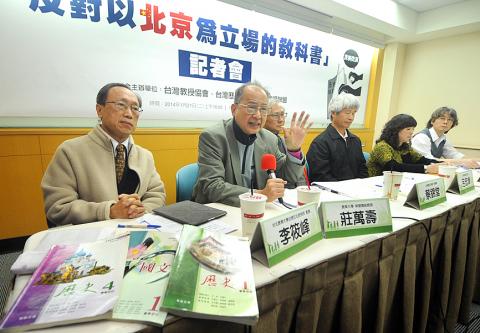A public hearing held by the Ministry of Education to make “small adjustments” in high-school history textbooks has sparked controversies over its procedures and content.
The hearing, called by the National Academy for Educational Research to adjust the social science and language curriculums, was panned for its “almost sneak-attack style” and for “distorting” the discussion about textbook changes.
The “small” adjustments suggested for history textbooks include the revival of terms “intended to legitimize the colonial rule of the Chinese Nationalist Party [KMT] regime,” Taiwan Association of University Professors president Lu Chung-chin (呂忠津) said yesterday.

Photo: Liao Chen-hui, Taipei Times
Lu highlighted such phrases as the “glorious retrocession” of Taiwan, which was ceded to Japan in the Treaty of Shimonoseki after the First Sino-Japanese War and administered by Tokyo from 1895 to the end of World War II, and the “relocation of the government to Taiwan,” referring to the KMT regime’s retreat to Taiwan.
Taiwan History Association chairman Tsai Ching-tung (蔡錦堂) questioned the appointment of people with no professional background in history to serve on the history curriculum adjustment taskforce, referring to Shih Hsin University professor Wang Hsiao-po (王曉波) and Fo Guang University Chinese literature professor Hsieh Ta-ning (謝大寧). Wang has been named convener of the committee.
Tsai also questioned the legitimacy of the changes, noting that the current history curriculum went into effect in August 2012 after a series of difficult and heated debates that had delayed its rollout for a year.
“Were other committee members notified and asked for comments about these so-called ‘small’ adjustments to be implemented as the result of a public hearing,” he said.
Fu Jen Catholic University history professor Chen Chun-kai (陳君愷) accused the ministry of conducting a “sneak attack” to hold the hearing.
“We have been told that teachers were informed about the public hearing only after the deadline for registration had passed,” Chen said, holding up a printout of an announcement made by National Formosa University on its Web site on Wednesday last week.
The notice said the deadline for registering to attend the hearing was Tuesday last week for people in the north of the nation and Monday last week for those in the center and south.
National Taipei University of Education professor of Taiwanese history Lee Hsiao-feng (李筱峰) said the changes were part of an effort by the KMT government to pander to Beijing’s unification ambitions.
Lee was particularly incensed over the government’s use of the word “mainland” instead of “China,” a wording he said intimated at the notion of “one China, two regions,” and its citing of the Cairo Declaration of 1943, which stated that Formosa shall be restored to China, as the sole explanation for Taiwan’s sovereignty.
“The declaration was not a treaty and was not signed by the Allied powers’ leaders,” Lee said.
Japan surrendered in 1945 to the four Allied powers, and in the Treaty of San Francisco in 1951 it “renounced” its claim over Taiwan, but did not specify to whom, “an arrangement made by [then US president Harry] Truman to obstruct the People’s Republic of China’s possible takeover of Taiwan,” Lee said.

Chinese spouse and influencer Guan Guan’s (關關) residency permit has been revoked for repeatedly posting pro-China videos that threaten national security, the National Immigration Agency confirmed today. Guan Guan has said many controversial statements in her videos posted to Douyin (抖音), including “the red flag will soon be painted all over Taiwan” and “Taiwan is an inseparable part of China,” and expressing hope for expedited reunification. The agency last year received multiple reports alleging that Guan Guan had advocated for armed reunification. After verifying the reports, the agency last month issued a notice requiring her to appear and explain her actions. Guan

A preclearance service to facilitate entry for people traveling to select airports in Japan would be available from Thursday next week to Feb. 25 at Taiwan Taoyuan International Airport, Taoyuan International Airport Corp (TIAC) said on Tuesday. The service was first made available to Taiwanese travelers throughout the winter vacation of 2024 and during the Lunar New Year holiday. In addition to flights to the Japanese cities of Hakodate, Asahikawa, Akita, Sendai, Niigata, Okayama, Takamatsu, Kumamoto and Kagoshima, the service would be available to travelers to Kobe and Oita. The service can be accessed by passengers of 15 flight routes operated by

GIVE AND TAKE: Blood demand continues to rise each year, while fewer young donors are available due to the nation’s falling birthrate, a doctor said Blood donors can redeem points earned from donations to obtain limited edition Formosan black bear travel mugs, the Kaohsiung Blood Center said yesterday, as it announced a goal of stocking 20,000 units of blood prior to the Lunar New Year. The last month of the lunar year is National Blood Donation Month, when local centers seek to stockpile blood for use during the Lunar New Year holiday. The blood demand in southern Taiwan — including Tainan and Kaohsiung, as well as Chiayi, Pingtung, Penghu and Taitung counties — is about 2,000 units per day, the center said. The donation campaign aims to boost

The Central Weather Administration (CWA) said a magnitude 4.9 earthquake that struck off the coast of eastern Taiwan yesterday was an independent event and part of a stress-adjustment process. The earthquake occurred at 4:47pm, with its epicenter at sea about 45.4km south of Yilan County Hall at a depth of 5.9km, the CWA said. The quake's intensity, which gauges the actual effects of a temblor, was highest in several townships in Yilan and neighboring Hualien County, where it measured 4 on Taiwan's seven-tier intensity scale, the CWA said. Lin Po-yu (林柏佑), a division chief at the CWA's Seismological Center, told a news conference